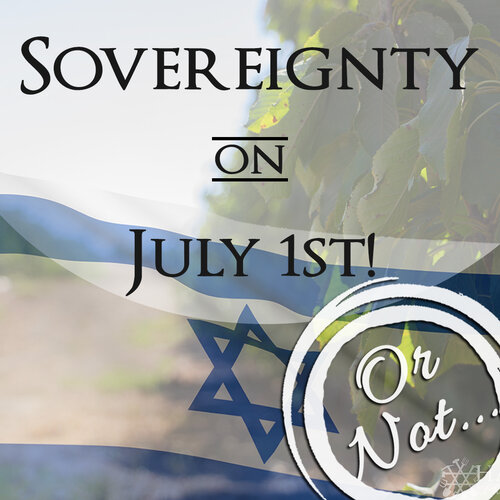July 1st was a date many in Israel had their hopes pinned on. It was the first possible date, according to President Trump’s “Deal of the Century” peace plan, when Israel could advance the application of sovereignty in Judea and Samaria. Many expected an announcement from Prime Minister Netanyahu on this date. They were disappointed. Instead, there were several other events that happened on July 1st – all having to do with applying sovereignty, but not moving it forward.
Of course, this was only the first possible date that legislation could be advanced for sovereignty according to the American peace plan. If Israel wants to move forward with the plan, they have the next three months to advance legislation. In the meantime, there are all kinds of speculations flying around concerning what is actually going to happen.
In one surprising twist of events, Tzipi Hotovely, Israel’s settlement minister and part of the US-Israel mapping team, stated on July 1st that Israel will not:
- back a Palestinian state
- create isolated enclaves in Judea and Samaria
- freeze construction within any of the settlements
This is a new development, and if true, would be a welcome announcement to those in the right wing camps. Hotevely said that when the issue of sovereignty is brought before the Knesset, it will be voted on separately from Trump’s peace plan. In an article with Israel National News, she is quoted as saying: “The Israeli government does not accept the Trump plan as part of the government decision. All that we have said is that we are prepared to call the Palestinians to negotiations on the basis of the plan, and based on the framework on the table….Right now, there is a gap between our position and that of the Americans, who are coming into a complicated election season.”
Ayelet Shaked, leader of the Yamina party, had a few different things to say regarding sovereignty when she visited the settlement of Har Bracha this week, also on July 1st. After participating in the inauguration of a new neighborhood in Har Bracha on Wednesday this week, Shaked had only strong support for this Jewish community. Speaking to Israel National News she said: “I am in Har Bracha, a strong community that should reach 26,000 residents, a large city in Israel, that is the goal.”
About sovereignty, she said: “The Trump plan freezes this community and that is why, as I said, the plan is not good. We hoped that it would be possible to accept the good, the application of sovereignty, without having to pay the bad. At the moment we know that everything is delayed.
“The Israeli government has never recognized a Palestinian state and there is no need for this government to do so for the first time; that is why I say that I am in favor of applying sovereignty but in no way agreeing to dangerous precedents.”
Meanwhile, a surprising show of support was shown at the Knesset on July 1st from some unlikely sources. Lawmakers from parliaments in twenty countries signed a statement in support of sovereignty in Israel’s heartland. These lawmakers are all part of the Israel Allies Caucus in their respective parliaments.
The beginning of the letter reads: “We, the chairman of the Israel Allies Caucuses fully support our ally, the State of Israel, in her rights to apply sovereignty to the Jewish communities of Judea and Samaria.”
It goes on to say: “We affirm that the Jewish communities of Judea and Samaria have been a key part of the biblical and ancestral homeland of the Jewish nation for centuries.
“We know that Israel ensures free access for all religions to the important biblical sites in Judea and Samaria, including the Tomb of the Patriarchs and Matriarchs in Hebron, the site of Jacob’s dream in Beit El, and the tabernacle’s resting place in Shiloh, among many other religious sites.
“We believe that the application of sovereignty to these communities in Israel will not affect the Palestinian people negatively but rather bring the possibility for peace and prosperity closer to the region. Applying Israeli law to already existing Jewish communities in Israel can be part of a realistic regional peace plan which recognizes current realities.”
The signers of this letter came from such countries as Slovakia, Romania, Italy, Netherlands, Wales and Finland, Madagascar, Zambia, Malawi, Nigeria, Ghana, Kenya and South Africa, Mexico and Dominican Republic, Argentina, Guatemala, Colombia, and Suriname.
July 1st didn’t bring a declaration of sovereignty, but it did bring more light to the issue. On the one hand, Settlement Minister Tzipi Hotevely has stated that Israel is actively working on a sovereignty plan, but outside of the American plan. She was adamant that Israel will not create enclaves from any of the settlements, freeze construction in the settlements, or support the creation of a Palestinian state.
On the other hand, Ayelet Shaked, leader of the Yamina party, made statements pointing out the dangers that are detailed in the “Deal of the Century” while participating in a cornerstone laying ceremony for the construction of a new neighborhood in the community of Har Bracha.
In the meantime, we saw members of Parliament from European, African, and Latin American countries who signed a letter supporting Israel’s right to sovereignty in their biblical heartland.
What will ultimately happen? Only time will tell.
Continue praying for the peace of Jerusalem, and never align yourself with any compromises when it comes to the land of Israel.
Israel has a biblical right to apply sovereignty over the entire land of Israel, and we should never deviate from that position – it’s written in God’s Word.

